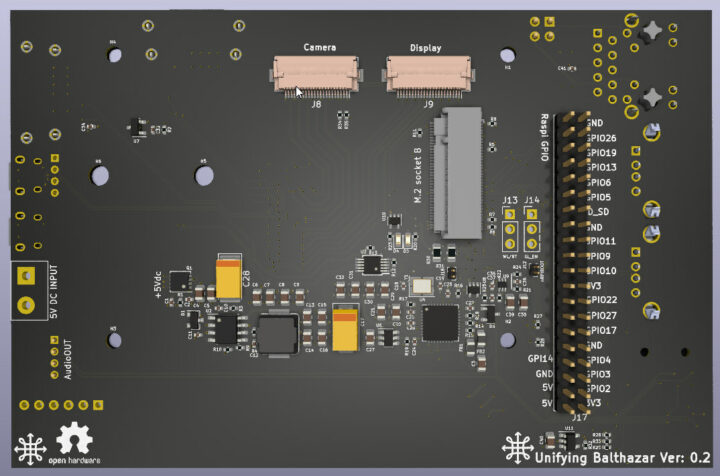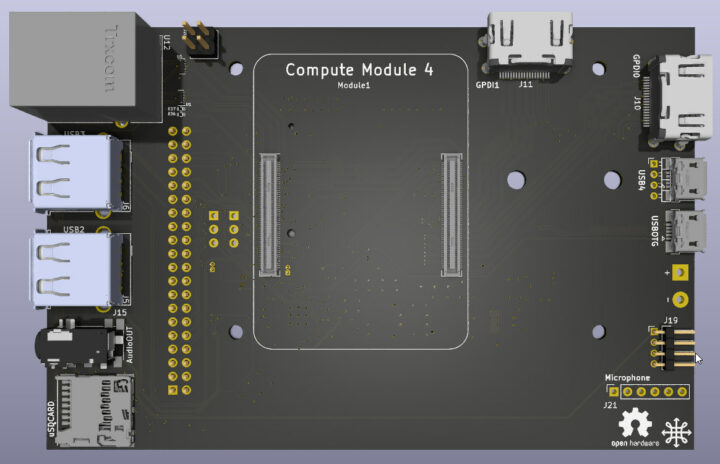The Balthazar Personal Computing Device (BPCD) is an open-source hardware 13.3-inch laptop with a RISC-V, Arm, or FPGA module and designed to be upgradable, expandable, and sustainable.
The developers say the laptop is based on a few concepts inspired by the EOMA68 project. The EOMA68 is a CPU module based on the PCMCIA form factor, and an Allwinner A20 EOMA68 module was showcased in a prototype of the Rhombus Tech 15.6-inch Libre Laptop but I don’t think the project was ever manufactured.
Balthazar laptop features:
- SoM with RISC-V, FPGA, or Arm Cortex-A7x processor plus memory and flash
- Storage – SATA SSD, eSATA connector, microSD card socket
- Display – 13.3-inch non-glare display
- Video Output – HDMI
- Audio – Speakers, detachable microphone array
- Camera – Detachable webcam
- Connectivity – Ethernet, WiFi
- USB – 2x USB 3.0 ports, Micro USB OTG port, Micro USB port
- User input
- Waterproof keyboard with an illuminated track-point ball (replaceable with various designs including x2xx ThinkPad keyboard)
- Multitouch touchpad
- Expansion
- Retractable and flexible robust flat-ribbon cable connecting GPIOs
- Misc – Volume wheel, hardware on/off switches for webcam, speakers, microphones array, and Wi-Fi.
- Battery
- 10,000+ mAh recyclable battery with quick charging support
- Secondary small battery enabling main battery hot swap.
- Recyclable enclosure with LEGO studs
If the specifications seem to lack clarity, especially for an open-source hardware project, it’s because work on the Balthazar laptop started in 2019, and several parts of the website have not been updated since then. But if we go to the project’s GitHub account we can see some recent (2022) activity for the case, keyboard, PSU, and unified PCB designed with KiCad 5.15 and shown below.
The laptop will take Raspberry Pi Compute Module 4 and compatible system-on-modules. I’m not sure which RISC-V CM4 module they plan to use, but the only one I had heard of so far was Antmicro ARVSOM with a StarFive JH7100 or JH7110 RISC-V processor.
One of the software side, we are told it should run Linux along with a low-level security layer software based on LUKS , Libreswan and they plan to make it GNUnet ready. The OS will depend on the module used, but I don’t see any code or OS image on GitHub unless it is hosted somewhere else…
The status of the project after 3 to 4 years is not reassuring, but The Register reports it was discussed at the Open Source Policy Summit in Brussels last week, and it is backed by the Dutch open internet foundation, plus the project has received funding from the European Commission’s Next Generation Internet (NGI) initiative. I can also see four contributors on the GitHub account, so maybe we’ll see an actual working prototype later this year or in 2024…
Thanks to TLS for the tip.

Jean-Luc started CNX Software in 2010 as a part-time endeavor, before quitting his job as a software engineering manager, and starting to write daily news, and reviews full time later in 2011.
Support CNX Software! Donate via cryptocurrencies, become a Patron on Patreon, or purchase goods on Amazon or Aliexpress







